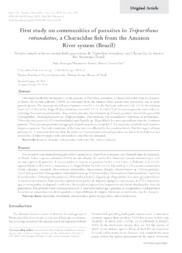First study on communities of parasites in Triportheus rotundatus, a Characidae fish from the Amazon River system (Brazil).
First study on communities of parasites in Triportheus rotundatus, a Characidae fish from the Amazon River system (Brazil).
Author(s): SANTOS, P. H. N.; TAVARES-DIAS, M.
Summary: This study was the first investigation on the parasites of Triportheus rotundatus, a Characiformes fish from the Amazon, in Brazil. All the fish collected (100%) in a tributary from the Amazon River system were infected by one or more parasite species. The mean species richness of parasites was 4.9 ± 0.9, the Brillouin index was 0.39 ± 0.16, the evenness was 0.24 ± 0.09 and the Berger-Parker dominance was 0.81 ± 0.13. A total of 1316 metazoan parasites were collected, including Anacanthorus pithophallus, Anacanthorus furculus, Ancistrohaptor sp. (Dactylogyridae), Genarchella genarchella (Derogenidae), Posthodiplostomum sp. (Diplostomidae), Procamallanus (Spirocamallanus) inopinatus (Camallanidae), Echinorhynchus paranensis (Echinorhynchidae) and Ergasilus sp. (Ergasilidae), but monogenoideans were the dominant parasites. These parasites presented an aggregate dispersion pattern, except for P. (S.) inopinatus, which showed a random dispersion pattern. The body conditions of the hosts were not affected by the parasitism levels. This first report of these parasites for T. rotundatus indicates that the presence of ectoparasites and endoparasites was due to hosts behavior and availability of infective stages in the environment, and this was discussed.
Publication year: 2017
Types of publication: Journal article
Unit: Embrapa Amapá
Observation
Some of Embrapa's publications are published as ePub files. To read them, use or download one of the following free software options to your computer or mobile device. Android: Google Play Books; IOS: iBooks; Windows and Linux: Calibre.
Access other publications
Access the Agricultural Research Database (BDPA) to consult Embrapa's full library collection and records.
Visit Embrapa Bookstore to purchase books and other publications sold by Embrapa.

